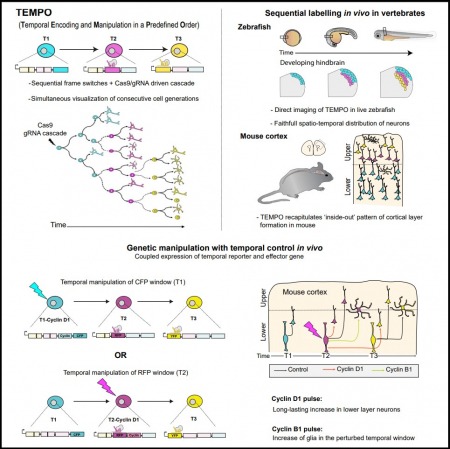TEMPO is a new tool that enables scientists to track and genetically modify consecutive generations of cells in vertebrates, including zebrafish and mice.
Tissues in our bodies are formed by various cell types which often appear sequentially. It is important for scientists to understand the order cells are born and come together to form tissues, but there haven’t been tools to easily follow the development of different generations of cells in tissue in real time.
Temporal Encoding and Manipulation in a Predefined Order, or TEMPO, solves that problem by labeling cells born during different time points in development with different colors, enabling tracking of different generations of cells as an embryo develops.
TEMPO is based on the gene-editing tool CRISPR. A synthesized system made up of blocks of DNA is inserted into the cells of a developing embryo. As the embryo grows, the system triggers each generation of cells to fluoresce in a different color.

In addition to identifying different cell lineages, TEMPO also allows researchers to genetically manipulate generations of cells to understand their function. For example, scientists can use TEMPO to introduce genes affecting cell division and see how that changes the proportion of neurons that form in a part of the brain.
TEMPO can work on different organisms and in any type of cell. Janelia Group Leader Isabel Espinosa Medina, who developed TEMPO while a postdoc in Tzumin Lee’s lab, plans to employ the tool in her own lab’s research examining the peripheral nervous system’s interaction with the pancreas.
A new paper detailing TEMPO was recently published in Neuron and featured on the journal’s cover.
###
Citation:
Isabel Espinosa-Medina, Daniel Feliciano, Carla Belmonte-Mateos, Rosa Linda Miyares, Jorge Garcia-Marques, Benjamin Foster, Sarah Lindo, Cristina Pujades, Minoru Koyama and Tzumin Lee. “TEMPO enables sequential genetic labeling and manipulation of vertebrate cell lineages.” Neuron, published November 22, 2022. DOI: 10.1016/j.neuron.2022.20.035
Media Contacts
Nanci Bompey





